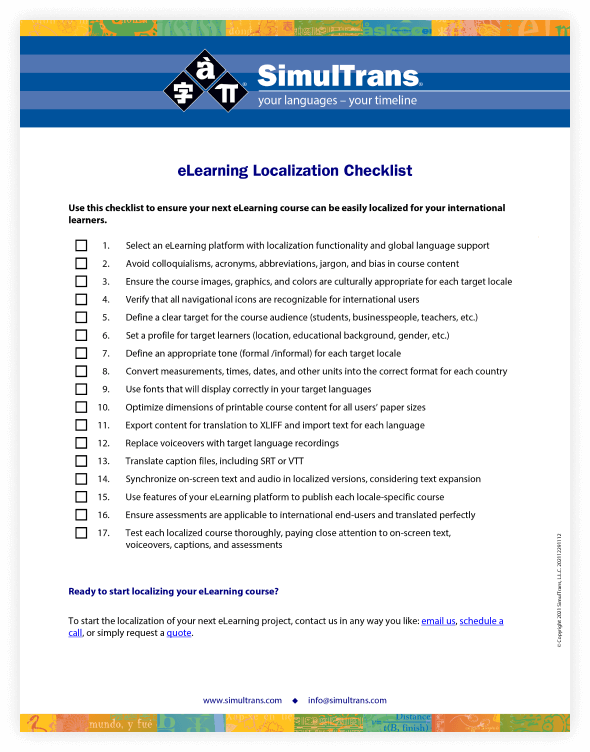


eLearning localization services
Comprehensive eLearning content translations
We translate eLearning content into 100+ languages. Our customers range from online education companies reaching millions of students to brands that localize training courses for their users and employees.
With in-house software engineers and video and audio specialists, we’re prepared to take on your next eLearning translation project, no matter the size or complexity.
SimulTrans’ professional native linguists use advanced technology to localize all components of your courses, including:
- Written content
- Audio and video
- Subtitles and closed captions
- Assessments
- Desktop software
- Mobile apps
How it works


How it works
- To begin the translation process, upload your files, receive a free quote, and approve it.
- SimulTrans’ expert linguists translate your eLearning content.
- SimulTrans’ audio engineers record voiceovers at our in-house studios with your choice of talent from our international voice talent pool.
- SimulTrans’ video engineers integrate your translated audio, video, and subtitles.
- We thoroughly review and test all course elements to ensure they work properly.
- You receive your localized course content.
Your eLearning translation project partner
SimulTrans is the preferred eLearning translation partner of so many leading brands because we understand the unique requirements and challenges that are involved in developing global training programs.
Our experienced teams are always available to work with you to find the best solution for your needs. This flexible, hands-on attitude is why we’ve been able to achieve a 97% customer satisfaction rate and remain a leader in the industry since 1984.
Benefits of partnering with SimulTrans:
- There’s never an added cost to you for the tools and technology we use to translate your materials.
- We’ll always suggest the most cost-effective solution for your needs.
- Translation memory saves time and money by reducing unnecessary rework while maintaining consistency.
- The SimulTracker portal keeps every project organized and improves collaboration between teams.
- We connect our systems to yours to automate ongoing translation projects, accelerating work and reducing admin needs.

eLearning Localization Checklist
More insights

Localization of eLearning Courses for the Manufacturing Industry

2026 eLearning Industry Challenges and Solutions

Ultimate Guide to SCORM eLearning Localization
Frequently asked questions
How much does eLearning translation cost?
Our eLearning translation services are priced as follows:
-
Full human translation and review work is charged per-word
-
AI-translation and human post-editing is charge per hour
-
Editing and testing the eLearning courses is charged per hour
-
Formatting the PowerPoint documents is typically charged per slide
-
Subtitling or voiceover for the videos is usually charged per-minute based on the video length
Can my files be translated into any language?
Yes. While some learning management systems are not fully compatible with bi-directional languages and extended character sets (causing problems for Arabic, Hebrew, and Asian languages), our engineers can create customized solutions and provide advice on tools and workarounds to support the translation of your content into any language.
How many courses can you translate at once? How long does it take?
That’s up to you. We can accommodate projects of almost any size by scaling your translation team (some projects have over 100 translators per language). Our translators work simultaneously, so the number of target languages won’t impact your timeline.
If it’s determined to be a good fit for your content, we can also use post-edited machine translation to enhance our human translators’ output and accommodate rapid timelines.
What learning management systems and file types do you use?
SimulTrans supports the most popular authoring tools for eLearning, training, and media content.
Tools we frequently work with include Adobe Premiere, Adobe Captivate, Articulate Rise 360, and Articulate Storyline 360, along with many others. File types we commonly work with include SCORM, XLIFF, xAPI, SRT, VTT, STORY, and many more.
If you’re using proprietary tools, our engineers will work with you to test different file formats and determine which will be most efficient for translation.
.jpg)

